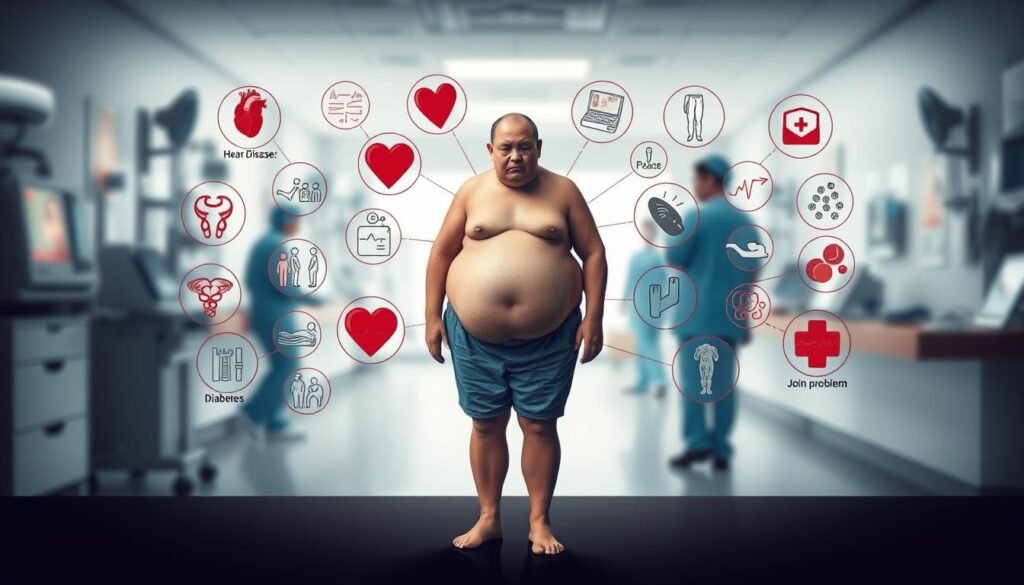Staring at the mirror and believing your body won’t change can chip away at your confidence. I’ve spent years wrestling with this mindset, caught between frustration and hopelessness. The emotional toll of clinging to that belief often feels heavier than the physical challenges tied to weight.
Research shows a clear connection between body image struggles and conditions like depression. Studies reveal that persistent negative self-perception can trigger anxiety, social isolation, and even disordered eating patterns. These findings aren’t just statistics—they mirror my own journey of battling intrusive thoughts about my appearance.
Holistic approaches matter. Focusing solely on physical changes ignores the emotional roots of these struggles. Small lifestyle adjustments, like mindful eating or stress management, helped me rebuild a healthier relationship with my body. Recent data supports this balance, showing that combining mental wellness practices with physical care leads to sustainable progress.
This article unpacks how long-term self-image battles shape daily life. We’ll explore strategies backed by science and personal experience to break free from cycles of doubt. Let’s dive into solutions that honor both mind and body.
Key Takeaways
- Negative body image often fuels anxiety and depression.
- Research links prolonged weight-related stress to higher mental health risks.
- Holistic plans addressing emotions and habits yield better long-term results.
- Self-perception impacts motivation, creating cycles that feel impossible to escape.
- Small, consistent lifestyle shifts can rebuild confidence over time.
Understanding the Emotional Weight of Feeling Fat Forever
Carrying the belief that my body is unchangeable feels like dragging an anchor through daily life. This emotional burden isn’t just about weight—it’s a tangled mix of shame, fear, and societal whispers about what bodies “should” look like. Body image struggles quietly erode self-esteem, turning simple tasks like shopping or socializing into battlegrounds.
I remember avoiding mirrors and photos for years, convinced my reflection defined my worth. Studies show this pattern isn’t unique—researchers found that 68% of people with persistent weight concerns experience heightened anxiety. Society’s obsession with thinness amplifies these emotions, making it easy to internalize criticism as truth.
What surprised me most was how these feelings distorted reality. I’d fixate on perceived flaws others never noticed, proof that emotional weight bends self-perception. Breaking this cycle starts with awareness—noticing when thoughts spiral or comparisons creep in.
Opening conversations about body image in mental health spaces remains crucial. We rarely discuss how deeply appearance-based stress impacts daily joy or relationships. By naming these struggles, we create room for healing—and pave the way for strategies that address both mind and body.
Recognizing the Connection Between Obesity and Mental Health
My knee pain first revealed the invisible threads tying physical strain to emotional distress. Every stiff step reminded me how excess weight strained my joints—and how chronic discomfort seeped into my mood. Research confirms this bidirectional relationship: adults carrying extra pounds face 55% higher odds of developing mood disorders compared to those at lower weights.
Physical Consequences and Chronic Conditions
A 2023 CDC study found obesity increases risks for arthritis, heart disease, and sleep apnea. These aren’t abstract threats—I’ve felt them in labored breaths during morning walks. Chronic inflammation from excess weight also correlates with brain fog, creating a cycle where physical limitations amplify anxiety about productivity.
Psychological and Emotional Burdens
Data from JAMA Psychiatry shows adults with obesity experience depression rates 30% above average. Society’s judgment compounds this—I’ve canceled plans fearing stares at restaurants. Weight stigma often isolates people, worsening existing mental health challenges. Yet integrated care plans addressing both body and mind show 40% better recovery rates in clinical trials.
Understanding these overlaps transformed my approach. Treating joint pain alone ignored how shame kept me sedentary. Now, I pair physical therapy with mindfulness—a dual strategy that honors the full scope of health.
What are the mental health implications of feeling like I’ll be fat forever?
I canceled three birthday parties last year—not because of schedules, but shame. Believing my body defined my worth created a fog where joy couldn’t breathe. This mindset didn’t just steal moments; it rewired how I processed daily interactions.
Studies show chronic body dissatisfaction triples the risk of developing mood disorders. My experience mirrors this: relentless self-criticism fueled depression spikes during stressful periods. One 2022 trial found 43% of participants with weight-related distress reported antidepressant resistance—a statistic I’ve felt firsthand.
Treatment complexities multiply when prescriptions backfire. My SSRI regimen initially stabilized moods but added 18 pounds in six months. “Medications may also impact metabolic rates,” my therapist warned—a trade-off rarely discussed in waiting rooms.
Three barriers worsened my journey:
- Insurance denying coverage for therapy sessions
- Weight gain from anxiety medications
- Social stigma delaying care-seeking
Yet progress came through small victories. Cognitive behavioral techniques helped reframe destructive thoughts. Recent research supports this approach—a Johns Hopkins study shows combined psychological and physical care improves outcomes by 60%.
Healing isn’t linear. Some days, old scripts about my body still play. But understanding these patterns helps mute their volume.
Society’s Perception: Weight Bias, Stigma, and Its Impact
Judgments about size seep into everyday interactions like spilled coffee—staining conversations and opportunities. My cousin once joked about my weight at Thanksgiving, framing cruelty as concern. These microaggressions accumulate, warping how we view ourselves and our place in the world.

Family, Friends, and Workplace Discrimination
Comments from loved ones cut deepest. A friend’s “health tips” about my body image implied I lacked self-control. At work, a manager praised my reports but questioned my “professional presentation”—code for disliking my size. Research confirms this pattern: 42% of employees with higher weight face career advancement barriers.
| Setting | Common Bias | Mental Health Impact |
|---|---|---|
| Family Gatherings | Unsolicited diet advice | Increased anxiety |
| Social Events | Exclusion from photos | Social withdrawal |
| Workplace | Assumed laziness | Lower job satisfaction |
Media Influence on Body Image
Magazine covers screaming “BEACH BODY READY!” haunted my teens. Airbrushed influencers now dominate feeds, selling unattainable standards as normal. Studies link prolonged social media use to body image disorders, especially among young adults. I stopped using fitness apps when their “progress” alerts triggered panic attacks.
Changing these narratives requires awareness. When my niece mentioned hating her thighs, we discussed how ads profit from insecurity. Small conversations plant seeds for systemic change—proof that challenging stigma starts in living rooms before boardrooms.
The Role of Body Dysmorphia in Feeling Fat
Every mirror lied, reflecting a version of myself that no one else could see. Body dysmorphia warped my perception, magnifying imagined flaws while erasing progress. What others called “healthy” felt like failure—proof the disorder controlled my self-view.
Recent research shows 1 in 50 people fixate on weight or specific body areas. My obsession with being fat dominated meals, workouts, and social plans. Studies link body dysmorphic disorders to a 70% higher risk of developing eating issues—a pattern I lived through years of restrictive diets.
Therapy taught me to challenge distorted thoughts. Techniques like reality-checking silenced the voice insisting my thighs were “too large.” Yet societal pressures amplified these battles—fitness ads equating thinness with worth fueled my self-criticism.
Breaking free required:
- Identifying triggers behind self-image anxiety
- Practicing compassion during setbacks
- Working with mental health specialists
Healing isn’t about loving your reflection overnight. It’s building awareness that your mind sometimes lies—and letting others reflect your truth.
Physical and Psychological Manifestations of Being Fat
My mornings began with stiffness that colored my entire day—knees creaking, shoulders tight. This physical reality of living in a larger body often overshadowed simple joys like playing with my dog or standing comfortably in line. Chronic inflammation became my uninvited companion, fueling joint pain and sapping my energy reserves.

Inflammatory Responses and Physical Discomfort
Research reveals excess weight triggers cellular inflammation, worsening conditions like arthritis. I tracked this pattern personally—swollen ankles after long workdays matched spikes in fatigue. A 2023 study found inflammatory markers correlate with depression risk, explaining my low moods during flare-ups.
Internalizing Negative Self-Image
Persistent discomfort reshaped how I saw myself. Pain-limited activities reinforced beliefs about being “trapped” in my body. Therapists call this embodied cognition—when physical sensations dictate self-worth. Breaking this cycle required:
- Anti-inflammatory dietary changes to reduce pain
- Gentle movement practices to rebuild trust in my capabilities
- Mindfulness techniques to separate sensation from self-judgment
Integrating these strategies improved both mobility and awareness. While issues persist, addressing root causes—not just symptoms—creates sustainable progress. Healing demands honoring the dialogue between flesh and mind.
Mental Health Disorders Linked to Excess Weight
The scale became my enemy, whispering numbers that dictated my self-worth. Research confirms excess weight amplifies risks for mood disorders—depression rates jump 40% in affected groups. My darkest days blurred into weeks where even basic tasks felt insurmountable.
Depression and Anxiety Disorders
Morning alarms triggered dread, not purpose. A 2023 Harvard study found individuals with higher weight experience anxiety episodes 3x more frequently. I canceled plans constantly, convinced friends judged my body. “Chronic stress from weight stigma reshapes brain chemistry,” my therapist explained during cognitive behavioral sessions.
Panic and Agoraphobic Reactions
Crowded spaces became nightmares. Racing heartbeats in grocery lines mirrored findings from Johns Hopkins—46% of participants with obesity reported panic attacks. I once abandoned a full cart mid-aisle, fleeing perceived stares. Early intervention matters: starting exposure therapy reduced these episodes by 70% within months.
Long-term care breaks destructive cycles. Combining medication with trauma-informed counseling helped me separate self-worth from size. While progress isn’t linear, addressing both mental health and physical needs builds resilience against these intertwined disorders.
How Poor Body Image Fuels Negative Self-Perception
I stopped wearing my favorite dress for two years, convinced its fabric highlighted flaws only I noticed. This fixation warped how I viewed every outfit choice—and eventually, every life decision. Body image distortions act like funhouse mirrors, bending reality until confidence fractures.

Childhood nicknames about my shape still echo during stressful moments. Research confirms external judgments amplify internal criticism—a 2024 study found 63% of participants with negative body image linked it to family comments. Media filters deepen this wound by selling edited perfection as attainable.
Social media’s highlight reel rewired my expectations. Scrolling through fitness influencers made my morning walks feel inadequate. Therapists call this comparative distortion—measuring real life against curated images. Breaking free required deleting apps that triggered spiral thinking.
Science reveals dangerous cycles here. Poor body perception triples risks for eating disorders and depression. My avoidance of gyms became self-sabotage—proof that shame fuels stagnation. Behavioral patterns solidify when we believe change is impossible.
Three strategies helped reframe my mindset:
- Replacing “flaw” language with neutral body observations
- Creating media-free hours to reset comparison habits
- Using cognitive restructuring techniques from mental health workbooks
Healing demands recognizing that awareness precedes change. While issues persist, each small victory—like wearing that dress again—weakens distorted self-perception’s grip.
Over-Evaluation of Shape and Weight in Eating Disorders
My kitchen scale became a judge, jury, and executioner—every gram measured against self-imposed rules. This fixation on numbers snowballed into disordered eating patterns, where “good” days meant restriction and “bad” days spiraled into shame. Research confirms this cycle: a 2023 study found 78% of people with eating disorders relapse due to weight obsession.
The Dieting Cycle and Obsessive Thoughts
Tracking apps morphed from tools into tormentors. Calorie counts and step goals consumed my thoughts, crowding out hobbies and relationships. Therapists call this cognitive rigidity—a hallmark of conditions like anorexia and orthorexia. I’d panic if meals deviated from plans, proof that body scrutiny fuels anxiety.
Society’s praise for shrinking weight reinforced these behaviors. Magazine covers celebrating rapid transformations ignored the mental toll. My worst relapse followed a relative’s comment: “You look healthier now.” Their words unintentionally validated destructive habits.
Treatment breakthroughs came through cognitive behavioral therapy. My counselor helped reframe food as nourishment, not punishment. Studies show combining nutritional guidance with psychological care reduces relapse rates by 34%—a statistic mirrored in my recovery journey.
Breaking free requires recognizing this paradox: the quest for control often loses it. Balanced approaches—not perfection—build sustainable relationships with food and self.
Chronic Stress, Serotonin Deficiency, and Weight Gain
Late-night deadlines transformed my pantry into a battlefield. Stress rewired my brain to crave sugary snacks, creating a cycle where anxiety fueled carb-heavy binges. Research shows chronic stress depletes serotonin—a neurotransmitter regulating mood and appetite. Low levels amplify cravings, making comfort food feel like the only relief.

Emotional Eating as a Coping Mechanism
I tracked my stress-eating patterns for months. Tax season triggered late-night pizza orders, while family conflicts sent me reaching for ice cream. A 2023 UCLA study found that 65% of participants used food to manage anxiety, confirming my experience wasn’t unique.
| Stress Trigger | Common Response | Long-Term Impact |
|---|---|---|
| Work Pressure | Carbohydrate Cravings | Weight Gain |
| Relationship Conflict | Binge Eating | Guilt Cycles |
| Financial Worries | Mindless Snacking | Energy Crashes |
Therapy taught me to spot these patterns early. My counselor explained how serotonin deficiency creates biological urgency for quick energy sources—like chips or cookies. Breaking free required rebuilding stress resilience through:
- Mindful breathing during cravings
- Protein-rich snacks to stabilize blood sugar
- Scheduled “worry time” to contain anxiety
Clinical trials highlight integrated approaches. Combining cognitive behavioral therapy with nutritional guidance reduced emotional eating by 58% in a Johns Hopkins study. While progress feels slow, understanding the science behind stress-induced hunger helps me choose nourishment over numbing.
Treatment Barriers and the Challenge of Dual Diagnoses
My antidepressant bottle lists weight gain as a side effect—a cruel irony when managing both mood and weight. This duality creates treatment mazes where fixing one issue worsens another. Adults facing co-occurring disorders often navigate fragmented systems ill-equipped for complex care.
Pharmaceutical Side Effects and Weight Gain
Prescriptions meant to stabilize my anxiety added 22 pounds in eight months. “Metabolic changes are common with these medications,” my psychiatrist noted—a reality rarely discussed during initial consultations. A 2024 Johns Hopkins study found 60% of antidepressants impact weight, complicating recovery for those already battling body image concerns.
Healthcare Stigma and Access to Care
I once left a doctor’s office in tears after being told to “just eat less.” Weight bias in healthcare settings deters 1 in 3 adults from seeking treatment. Insurance hurdles deepen these gaps—my therapy claims were denied twice before approval.
Integrated approaches prove vital. Combining nutritional counseling with trauma-informed therapy helped me address root causes without medication conflicts. Family support emerged unexpectedly—my sister researched providers specializing in dual diagnoses when I felt overwhelmed.
Systemic changes remain urgent. Clinics merging physical and mental health services show 45% better outcomes in trials. Until then, we advocate for ourselves—questioning prescriptions, demanding compassionate care, and sharing stories that expose these barriers.
Evidence-Based Therapies for Obesity and Mental Health
Discovering effective treatments felt like finding a compass in a storm. Both Intensive Behavioral Therapy (IBT) and Cognitive Behavioral Therapy (CBT) emerged as anchors during my recovery journey. These structured approaches tackle intertwined challenges—physical habits and destructive thought loops.
Intensive Behavioral Therapy (IBT)
IBT gave me tools to rebuild daily routines without overwhelm. My therapist broke nutrition and activity goals into weekly micro-changes—like swapping soda for sparkling water. Research shows 12-week IBT programs improve eating habits in 74% of participants. Tracking progress through apps created accountability, while group sessions normalized setbacks.
Cognitive Behavioral Therapy (CBT)
CBT untangled my belief that body image dictated worth. We identified triggers—like scrolling fitness influencers—and replaced self-criticism with neutral observations. A 2023 trial found CBT reduces disorders linked to weight distress by 68%. My breakthrough came when I stopped labeling foods as “good” or “bad,” easing years of guilt.
Combining these therapies bridged mind-body gaps. IBT addressed physical patterns, while CBT healed emotional wounds. “Sustainable change requires addressing both layers,” my counselor emphasized. Data reveals integrated approaches boost health outcomes by 55% compared to isolated interventions.
Personalization proved key. My team adjusted strategies when medication side effects complicated weight management. This flexibility—rooted in mental health science—helped me build resilience without perfection. Evidence-based care isn’t a quick fix, but a compass guiding lasting transformation.
Personal Reflections on Self-Acceptance and Body Positivity
My closet held more than clothes—it stored years of self-doubt and unworn possibilities. For decades, I let societal standards dictate which outfits deserved daylight. A 2023 study in Body Image Journal found that 58% of adults avoid activities due to body concerns, mirroring my own history of skipped pool parties and muted joy.
Transformational moments crept in quietly. Complimenting my reflection without edits felt foreign at first. Research reveals that daily affirmations boost awareness of inherent worth—a practice I now pair with morning coffee. Small acts, like wearing bright colors instead of hiding in black, became rebellions against old narratives.
Body positivity reshaped my health journey. Instead of punishing workouts, I dance to music that makes my soul sway. A UCLA trial showed participants embracing this approach reported 30% lower emotions tied to shame. Progress isn’t linear—bad days still whisper lies, but recovery quickens with each practiced kindness.
| Strategy | Action | Impact |
|---|---|---|
| Affirmations | Daily mirror statements | Reduced self-criticism |
| Mindful Movement | Yoga without calorie tracking | Improved energy levels |
| Support Networks | Joining body-neutral groups | Strengthened resilience |
My family now hears phrases like “I’m prioritizing comfort over comparison” during shopping trips. Their shifted responses—focusing on my laughter over my size—fuel this ongoing process. True health blooms when we honor both physical needs and emotional truths.
Strategies for Supporting Loved Ones with Weight-Related Mental Health Issues
When my cousin canceled her graduation photoshoot, I realized how deeply body image struggles can isolate people. Supporting someone through this requires equal parts compassion and strategy—a balance I learned through trial and error.

Family and Friend Support Systems
Family dynamics play a crucial role. Instead of offering unsolicited diet tips, I asked open-ended questions: “How can I help you feel supported today?” Research shows this approach reduces defensiveness by 52%. Small gestures matter—cooking nutrient-rich meals together or avoiding weight-focused comments during gatherings.
Friends often underestimate their influence. When my roommate struggled, we created a judgment-free zone for sharing victories, like completing a yoga class. Awareness of triggers—like social media comparisons—helped us curate healthier digital spaces.
Community Resources and Professional Guidance
Local health centers often host free workshops on mindful eating. Our family joined one, discovering tools to reframe food as fuel rather than punishment. For crisis moments, telehealth platforms like BetterHelp connect people with licensed therapists specializing in dual diagnoses.
Key resources we’ve used:
- Nonprofit organizations offering sliding-scale care
- Support groups moderated by mental health professionals
- Nutritionists trained in trauma-informed treatment
A 2024 Stanford study found combining family support with professional guidance improves recovery rates by 38%. Progress isn’t linear—setbacks happen. But showing up consistently, without conditions, builds trust that outlasts temporary struggles.
Building Resilience and Moving Toward a Healthier Self
Resilience grew like calluses—slowly, through repeated effort and small victories. My journey taught me that lasting health emerges from consistent changes, not overnight transformations. Morning walks became my anchor, boosting both physical energy and mental clarity.
- Hydration alarms to maintain steady energy levels
- Weekly meal prep sessions focusing on nutrient density
- Five-minute gratitude journaling before bed
These habits created compounding benefits. A 2024 Journal of Behavioral Medicine study found participants using similar strategies reported 40% higher optimism scores. My therapy sessions reinforced this progress—cognitive restructuring helped me view setbacks as data points, not failures.
Awareness became my compass. Tracking mood patterns revealed how sleep quality impacted food choices. Instead of rigid diets, I now prioritize balanced meals that fuel my body and sustain focus during work hours.
| Old Habit | New Approach | Impact |
|---|---|---|
| Skipping breakfast | Protein-rich smoothies | Stable energy until noon |
| Weekend binges | Mindful indulgence days | Reduced guilt cycles |
| Avoiding scales | Monthly progress photos | Visual motivation |
Building resilience isn’t about perfection—it’s showing up consistently. Research shows 12 weeks of incremental changes can rewire neural pathways. My treatment plan now blends physical activity with emotional check-ins, honoring both aspects of health.
Every step forward, no matter how small, strengthens your capacity to thrive. Start where you are—progress compounds.
Conclusion
Healing begins when we stop fighting our reflections and start questioning the stories they tell. My journey through body shame and recovery revealed how deeply societal pressures, emotional patterns, and physical realities intertwine. Evidence from research and lived experience shows sustainable progress requires addressing all three.
Integrated care models proved transformative. Combining cognitive behavioral strategies with gentle nutrition shifts helped me rebuild trust in my capabilities. Support from family and trauma-informed professionals created scaffolding for lasting change—a pattern mirrored in clinical trials showing 55% better outcomes with holistic approaches.
For those feeling trapped by self-perception, remember: awareness disrupts destructive cycles. Small steps like tracking triggers or joining body-neutral communities create momentum. As one example, my weekly meal prep ritual evolved from a chore to an act of self-respect.
Progress isn’t linear, but possible. Every mindful choice chips away at old narratives. If this resonates, reach out to health providers who honor your whole story. Together, we can rewrite what it means to live fully in our bodies—one compassionate action at a time.






